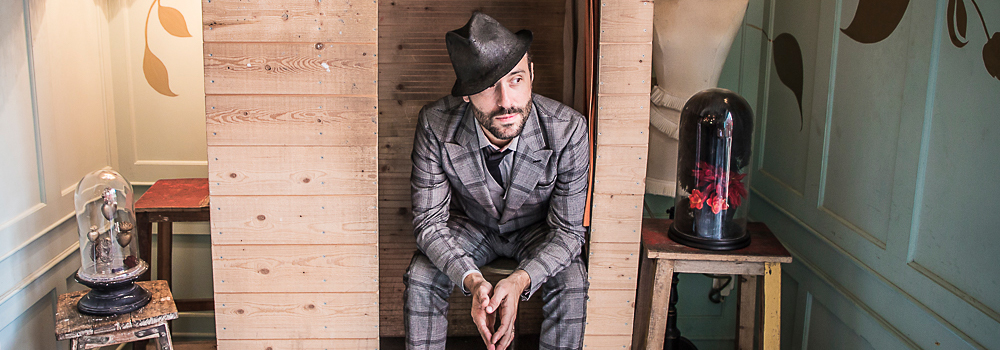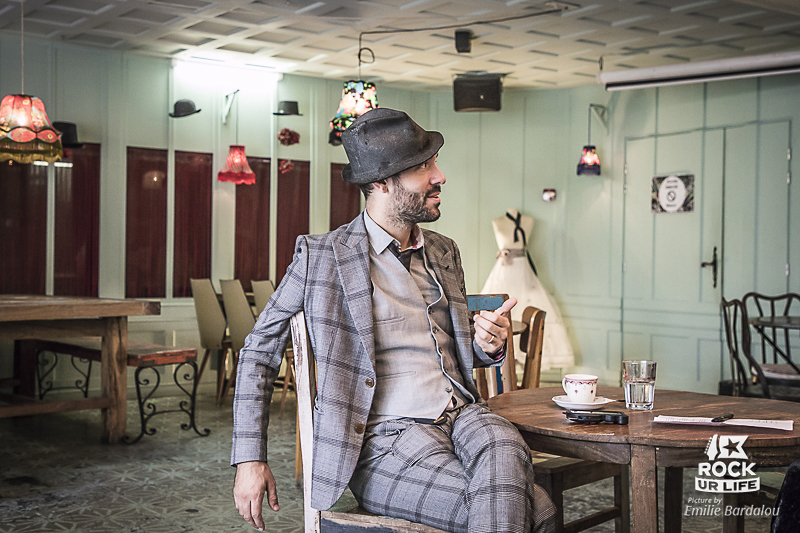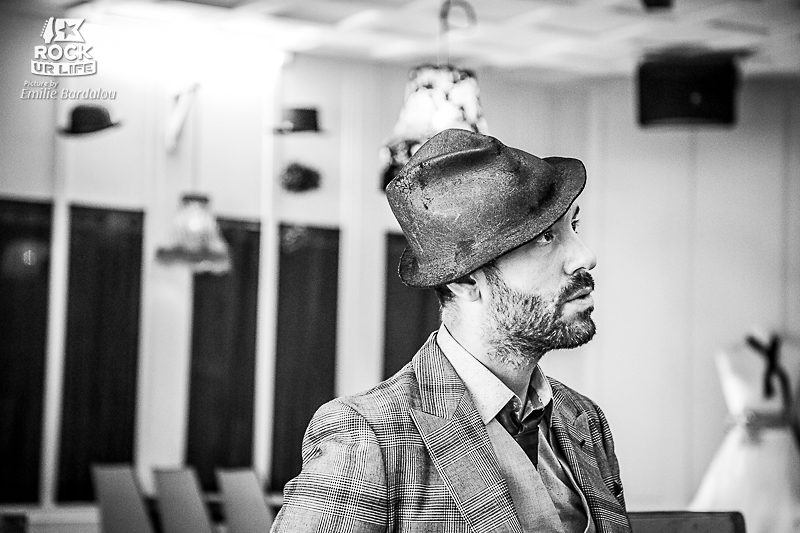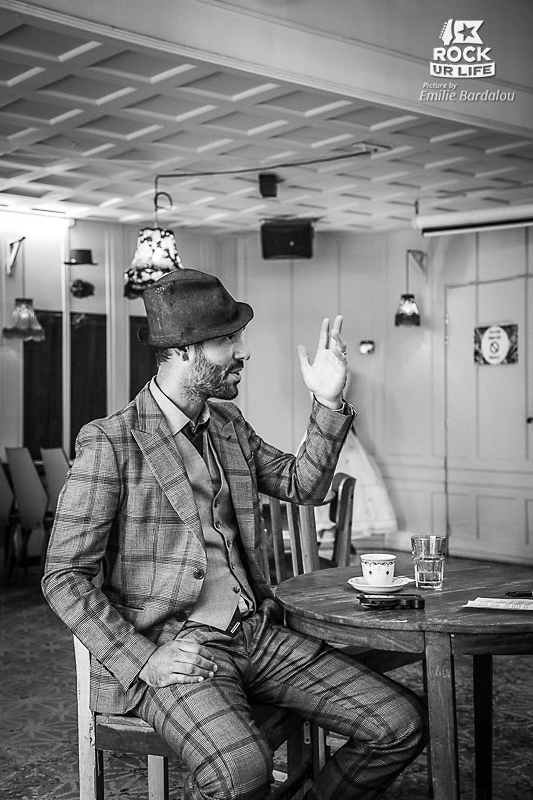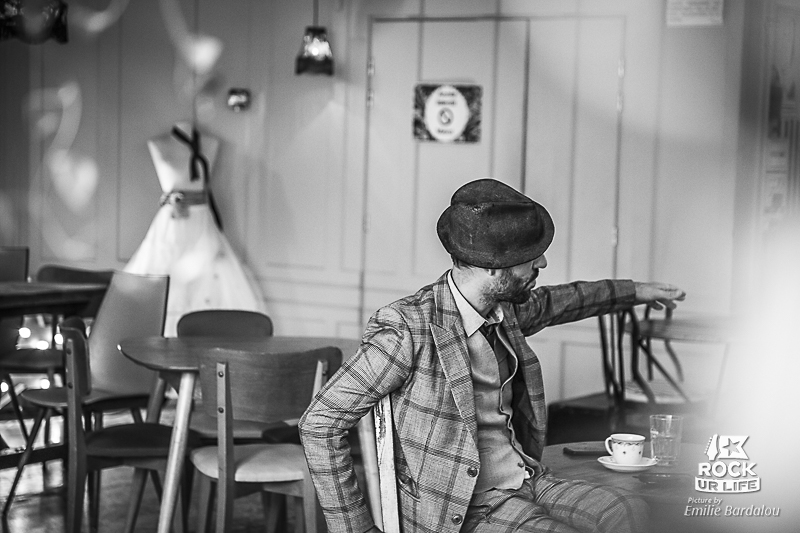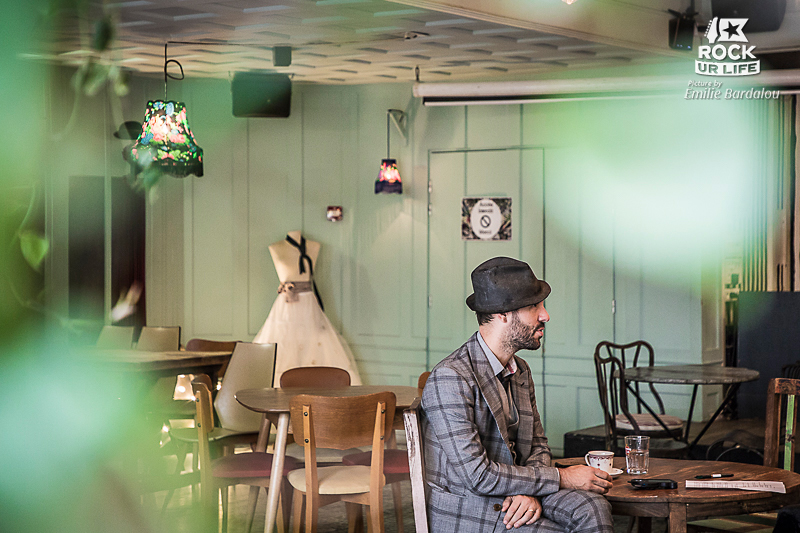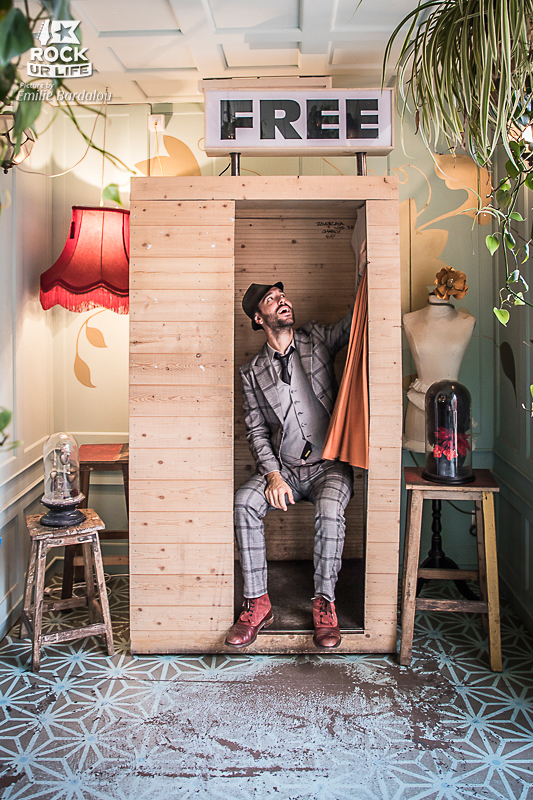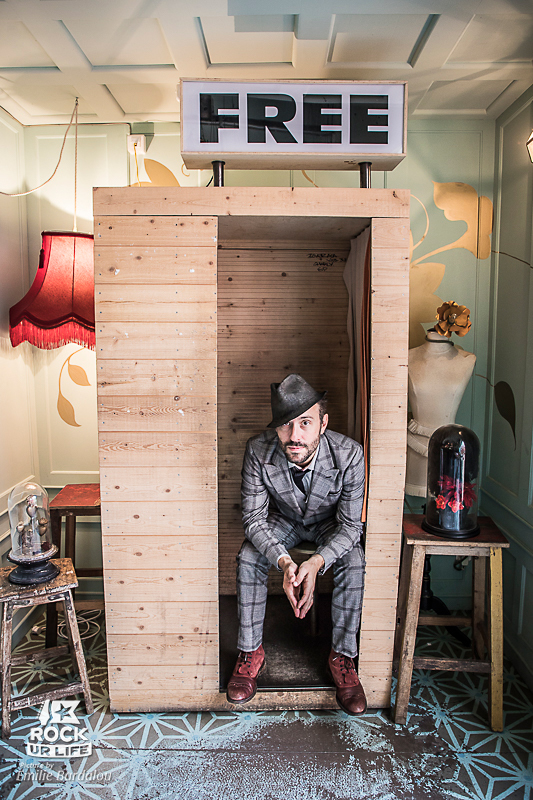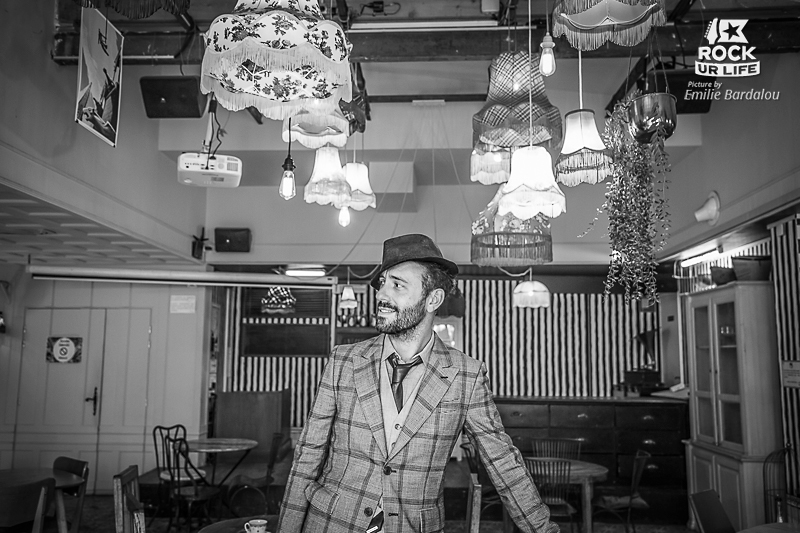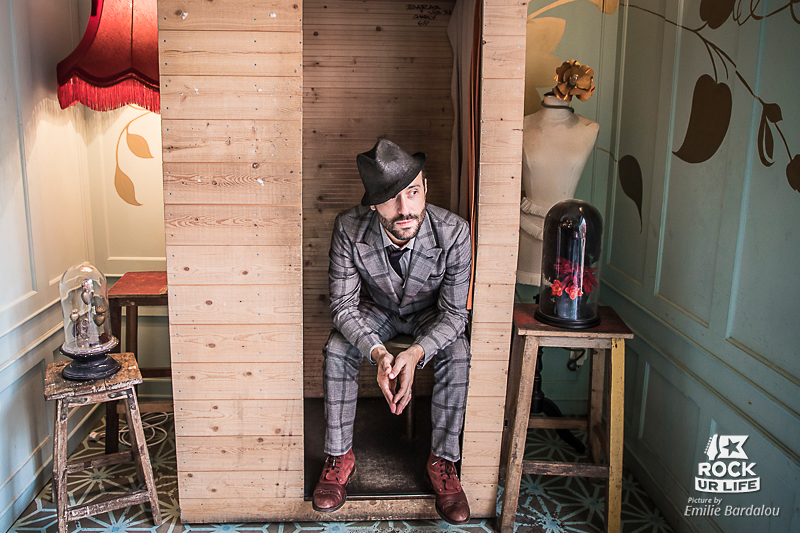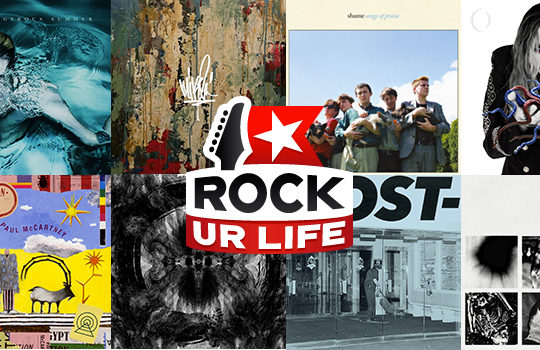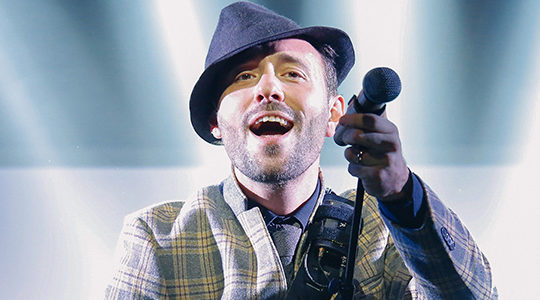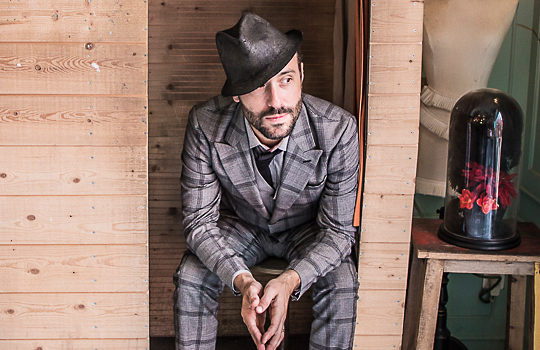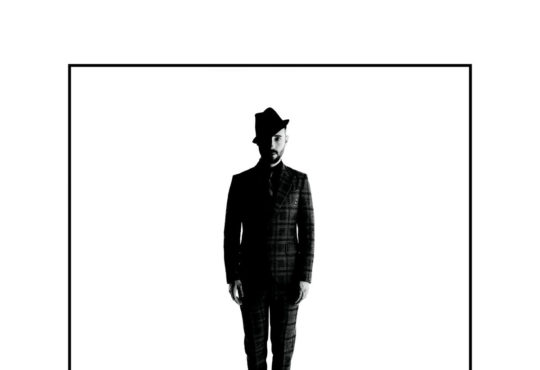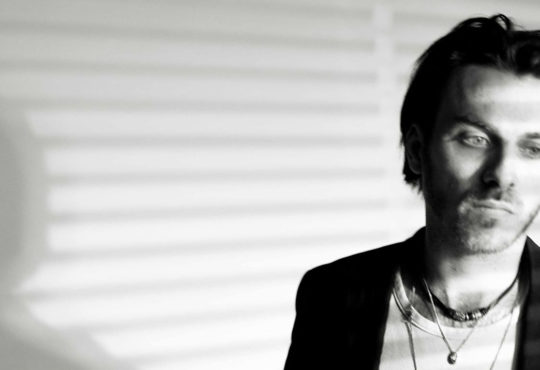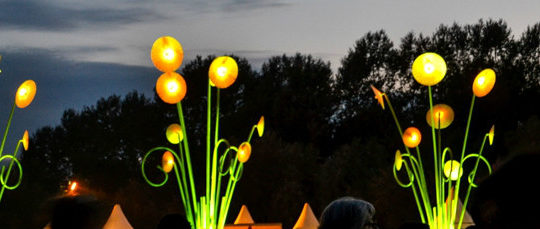A Parisian vintage themed bar decorated with thrifted furniture is where RockUrLife’s team met Charlie Winston, whose radiant and generous personality enhanced the conversation about his new album, “Square 1”.
Hello Charlie, very nice to meet you. First, how are you?
Charlie Winston: I’m good, thank you. I’m just really tired, which is a bit annoying, but I’m trying to wake myself up with more coffee. I hope you’re doing good too.
We do, thank you. Let’s take a deep dive into your new record, because there’s a lot to talk about. Its title, “Square 1”, means getting back to the start, which often means failing, making mistakes in order to learn and grow out of it. What is your perception and approach to mistakes in your life, both as a human being and an artist?
Charlie: This is exactly it. You can just do the interview for me. (laughs). I think my relationship with mistakes has developped and evolved. Let me go back to “Square 1” first, because it is what you said it is: about failure, but also being present. Where you’re at square one as a creative person, it’s like the white page. If you’re any type of person who wants to do something, you come to this moment of being with yourself. The white page is you. It’s a mirror that reflects your own reflexion on what you want to say, and how you want to say it. You wonder how you’re going to make a mess on this white page. As a musician, it’s about how I am going to break the silence, when silence is golden. If you want to make an omelette, you’ve got break an egg. That moment between breaking that beautiful round egg shape thing designed by nature, and after you broke it and created something, is what “Square 1” is for me. It’s the way it comes out of this blackout, meditation place where you come back to yourself. Failure is accepting that everything is finite. You could have made so many achievements in your life, but at some moment you have to let go of that and come back to yourself. That is a kind of failure. You fall and you realize you’ve got to get back on your feet. What failure means to me is that we are taught in school and society that failure is a bad thing. Actually, it’s the total opposite. It’s just about how you view it. You could have a good relationship to failure. Actually, the most successful people in the world are good at what they do because they have a good relationship with failure. If you don’t make it who you are, the results of your actions of you are, you’re missing the opportunity to do it again and be better each time.
It reminds us of the song “Here I Am”. At first, the lyrics seem to reflect your own personal experience with the school system, yet there’s a hidden message related to society’s perception of failure and success. Those multiple meanings in your songwriting are something very present in this album.
Charlie: Yes, totally. This song was originally called “Fail Forward” by the way. The concept of it is that when you’ve got nothing, you’ve got nothing to lose. When you have nothing, you have no baggage to carry, so you’re free to go wherever you like. I’m taking this approach in my life, but at shows as well. I’ve always had a setlist, but now I don’t. I arrive on the stage, and I play what I feel like playing at the moment. I am not going on stage with the baggage of my career. What was really frustrating to me live was that whether it was my technical team or the audience, everybody knew which songs I was about to play. I felt like a prisoner to this map. I kind of still have a map, but the difference now is that I want everybody to be scared. They don’t know what’s coming, so you have to stay alive and alert. It’s not for the audience that much, but mostly for my team. At first, my sound and light engineers were a bit nervous about that, but now they’re enjoying the prospect of every show being different.
Does that mean that they have to improvise? That’s quite a challenge.
Charlie: Yes, completely. It’s a really big challenge for the light man especially, because he is doing his own show. We’re trying to work at how we can compromise so it works on me on stage as well. We’ve come up with a few cool concepts. It’s basically learning a new langage. And that’s the thing about “Square 1”: what’s the langage you have within yourself? When you talk to yourself, when you listen to yourself, how do you listen? I could have grow up listening to all these criticisms from my teacher saying I was never good enough. But I told myself that if I started listening to him, I would probably end up being really doubtful about everything I’d do. How we talk to ourselves is how we talk to the world.
There is indeed something very optimistic in this album. It starts with “Spiral”, which has a very cinematic vibe and lyrics filled with doubt, trouble, then it ends with “Get Up Stronger” which is hopeful. Loads of different emotions take place in between those two songs, almost as if there was a story throughout the record. Was that your intention to build up this narrative arc?
Charlie : Definitely. I wanted it to be a thematic album as much as possible. It’s like making a photo album. People don’t make physical photo albums anymore, but I grew up with it. When you make it, you think about storytelling. We are story creatures, that’s why we’re the most sophisticated creatures on the planet. It’s not just about our intellect or physical capability, but because of the storytelling. The more stories are told, the more you start to believe in those fictions. A story, as a writer, can be a song. But then I want to make an album, so I’ve got to make a thread throughout the record. This is why in “Spiral”, I say “I’m in hell, help me out”, because I’m very low at that point. And through the album, you get throw different emotions, explorations on that subject, before you reach the last song that basically says that if you hit the floor, you should get up stronger. It’s really about having a positive look on failure, again. As soon as I wrote “Spiral”, I was convinced that was the first song of the album. I don’t know why, but I told myself “This is the opening song!”.
Maybe because as soon as you listen to the song, you’ve got images coming to mind. When we listened to it, we were picturing characters of a Tim Burton movie, falling down an endless black hole.
Charlie: Nice. That’s why it’s the first song. The concept of it is that essentially, you can spiral down, or you can spiral up. We have that choice. You can spiril out of control, or you can spiral into something beautiful. Instead of feeling like you’re on a loop, making the same mistakes, you learn something. So it’s failure, not mistake. It’s actually a success.
Vulnerability is very important in “Square 1”. It’s also reflected in the way you’ve composed it, as you were jamming with your team.
Charlie: It was indeed very important in the process of making this album. When I went into the studio the first time, I was really lost for the first few days. We’d had a rehearsal a few weeks before, so my team did know the songs. We’d play the songs once, and kind of recorded them roughly. But then the whole team would walk in, looking at me, being like “OK, what are we gonna do?”, and I said that I didn’t know. I didn’t want to tell people what to do this time. I did that for the last album, I had a vision of what I wanted to do. The whole thing about this album is that at the end of 2016, I lost the interest of playing music. I kind of quit. I decided that if I’m going to play music again, I want music to come back to me naturally, almost without me noticing. When we made the record, the whole thing was that I didn’t want to tell her, music, what to be. If she was coming back into my life, I wanted her to be herself. So, the only way to do that was to be with her. And to do that with music means to just sit down with your instrument and play. This is why we spent one week just jamming for hours. We would then record everything, go and listen, and see which parts would get us the more excited or inspired. By the end of the week, everybody knew what I wanted to do, just because of what I got excited about in the jam. When we started to make the record, I didn’t even need to be in the room, because I had shared my vision with the people. I was often buying food and cooking for everyone. Of course I was present, but I wasn’t there all the time, because I didn’t need to be. That was really liberating for me, because I’ve worked with good musicians, engineers and producers. They all pushed it in the right direction. About vulnerability, the really important thing about this record was not to be too overthought. I wanted it to have minimum amount of things in each track. Even if some tracks have a lot of things going on, ultimately, when it comes to the mix, it’s just the band and getting to the song, and the song is always the key. If elements don’t serve the motion of the song, then they go. We were very strict about that rule, but not pressured at all.
With “Curio City” (2015), your previous record, you used more electronic, pop sounds, whereas you went back to the roots of your musical identity with organic sounds on “Square 1”. What attracted you to this kind of sound in the first place?
Charlie: I think it’s that I’m a people person. When you hear an organic sound, you immediately associate it with people. Also, without wanting to sound like I’m a servant to my audience, I can’t do whatever I want. I could, but I think it would be a huge shock to hear something extremely different from who I am. That’s one thing I realized on this album: there’s still a lot to explore within this frame work of what I do, within my guitar playing, my piano playing, my lifetime of influences. I can use them and include them in what I do, I don’t have to go very far away from that model to explore stuff. Also, I want to keep the connection with my public, keep this conversation with my fans. I think coming back to square one is basically coming back to the point of my life where I am enough. What I do is enough. Playing something simply on the guitar or piano is something a lot of people can’t do that way that I do it; it is unique to me. That’s something in the world that should be put out a lot more. Moreover, now that I have kids, I don’t necessarily have the energy to overthink as much as I used to. (laughs). It has given me a lot more freedom to say that when I put on a hat and these clothes, I’m Charlie Winston. That identity has its place. It’s my job. When I’m at home, I’m different, I’m a dad. It’s not about me anymore. It’s really nice having this separation. So when I go on stage, I appreciate it for the simpleness of it. It’s healthy, it has given me a lot of peace. It’s a very peaceful record, even though there’s melancholy and all these kinds of emotions.
You seem more honest with who you are in this album.
Charlie: Yes, I think so. I wanted it to be more naked, more raw. I have nothing to hide on this record compared to previous ones. But that’s life, isn’t it? It takes a lot of time to understand. You only realize when you look back at yourself.
Some songs like “Airport” or “Losing Touch” have a social, almost political undertone to them. Is there any other track that you’ve composed with the same intention?
Charlie: “Get Up Stronger” is actually about bullying. For me, that was in the same group of those two, because bullying is very social. It’s a real problem. In England it’s talked about a lot, maybe not so much in France. For me, these songs are not political at all. They’re about people’s stories, their suffering, their relationship with the world. “Get Up Stronger” was me asking myself: “If my children were really badly bullied, what would I tell them?”. Being bullied is, I believe, one of the loneliest things that could happen to you. I know some people who had it really bad. It was inspired by a radio program I heard in England where there was four parents whose children had been bullied so badly that they either ended up in mental hospitals, or committed suicide. So, it’s about empathy. “Losing Touch” is a bit different because that’s more personal to me. I’ve had my own Brexit for the last ten years since I became big in France, not really big in England. Slowly, I’m becoming more and more French. My wife is French, my children are “Frenglish”.
It’s already time for our last question, on a lighter note this time. 2018 is almost over, so what rocked your life this year?
Charlie: People and nature.
That’s a good conclusion, as organic as the album. Thank you very much for your time and detailed answers.
Charlie: Thank you for paying so much attention to the record!
Website: charliewinston.com



